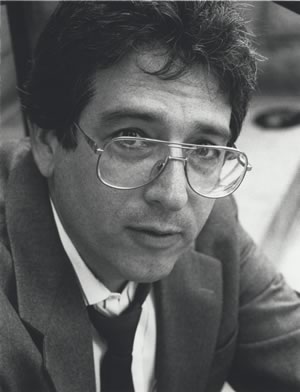Leonard Zeskind
The images most commonly associated with hate groups are of white-robed Klan members and skin-headed neo-Nazis. “The majority of Americans think that the Klan and the Nazis are the bad guys, and the rest of American society is normal. They think that the white supremacists are uneducated people with tobacco juice dripping from their mouths,” Leonard Zeskind explains. “Nothing could be farther from the truth.”
Through his research, Leonard has repeatedly demonstrated that hate group activity is the product of neither a handful of demented minds nor an idiosyncratic subculture, but is a significant trend gradually influencing the political mainstream through figures such as David Duke and groups like the right-wing Christian Identity movement. “White supremacists are strange, but they are not from Mars. My challenge is finding a way to connect my work to people’s lives and make my material accessible,” he explains. “I know what I’m trying to do wherever I am, but wherever I am changes. I work with farmers, religious leaders, white street punk types in Oregon, local NAACP chapters, and German university students. One size doesn’t fit all, so I have to tailor my approach, and use different techniques to educate about hate group activity and influence.”
For twenty years, Leonard has worked to monitor Klan, neo-Nazi, and other white supremacist activity. He has publicized the activities of these white supremacist groups in America and in Europe through public education, advocacy, victims’ assistance, and leadership training. His careful research analyses have exposed the international scope, strength, and resiliency of organized hate groups.
Leonard grew up in the early 1960’s. “I came of age at a period of time when race was high on the national agenda. At my bar mitzvah, a member of the NAACP spoke in the synagogue. It was the way you grew up in those days, and I just didn’t stray from that.” Leonard dropped out of college, became involved in the anti-war movement, and started working with white youth gangs, “tough glue sniffers.” He continued working for social justice as a labor organizer while supporting himself with factory jobs as a skilled welder, a millwright, an ironworker, and auto assembly line worker.
In 1978, Leonard began to focus on Klan and Nazi activity in the Midwest. In 1982, he began publishing The Hammer: Anti-Racist, Anti-Fascist News and Analysis. The magazine attracted national attention for its detailed research and persuasive analysis. Between 1985 and 1994, Leonard worked with the National Anti-Klan Network, later renamed the Center for Democratic Renewal, where he served as the director of research and intermittently as the acting executive director.
As a researcher, Leonard monitors hate groups by infiltrating their meetings, reading their publications, listening to videotapes, and interviewing defectors from their organizations. Leonard has been able to guide dozens of mainstream journalists through the maze of the fanatical right-wing. Leonard disseminates his information by lecturing on the radical right in training workshops for community groups, law enforcement professionals and clergy and in universities throughout Europe and the United States. Dozens of Leonard’s articles in publications ranging from the Village Voice and Rolling Stone to The New York Times document the ideological underpinnings of the white nationalist movement and trace the origins of racist support for political candidates like David Duke and Pat Buchanan. Leonard rejects “economic reductionism” (failed farms, declines in the oil industry, closed factories, inferior education) as the cause of the white supremacist movement as oversimplified. His book, Blood and Politics: The History of the White Nationalist Movement from the Margins to the Mainstream (2009, Farrar, Straus and Giroux), focuses on conflicting tendencies within the white supremacist movement—the continuing impulse for terror and violence on the one hand, and the transformation of marginal organizations into a political avant-garde on the other.
Leonard continues his work and mentoring of new activist researchers—”a future generation of Leonard Zeskinds.” As president of the non-profit Institute for Research and Education on Human Rights (IREHR) based in Kansas City, Leonard Zeskind continues to juggle his research and organizing with speaking engagements around the world. In 1998, the John D. and Catherine T. MacArthur Foundation awarded Leonard one of its five-year “genius” fellowships for his work.
 Photo by Dorothea von Haeften
Photo by Dorothea von Haeften